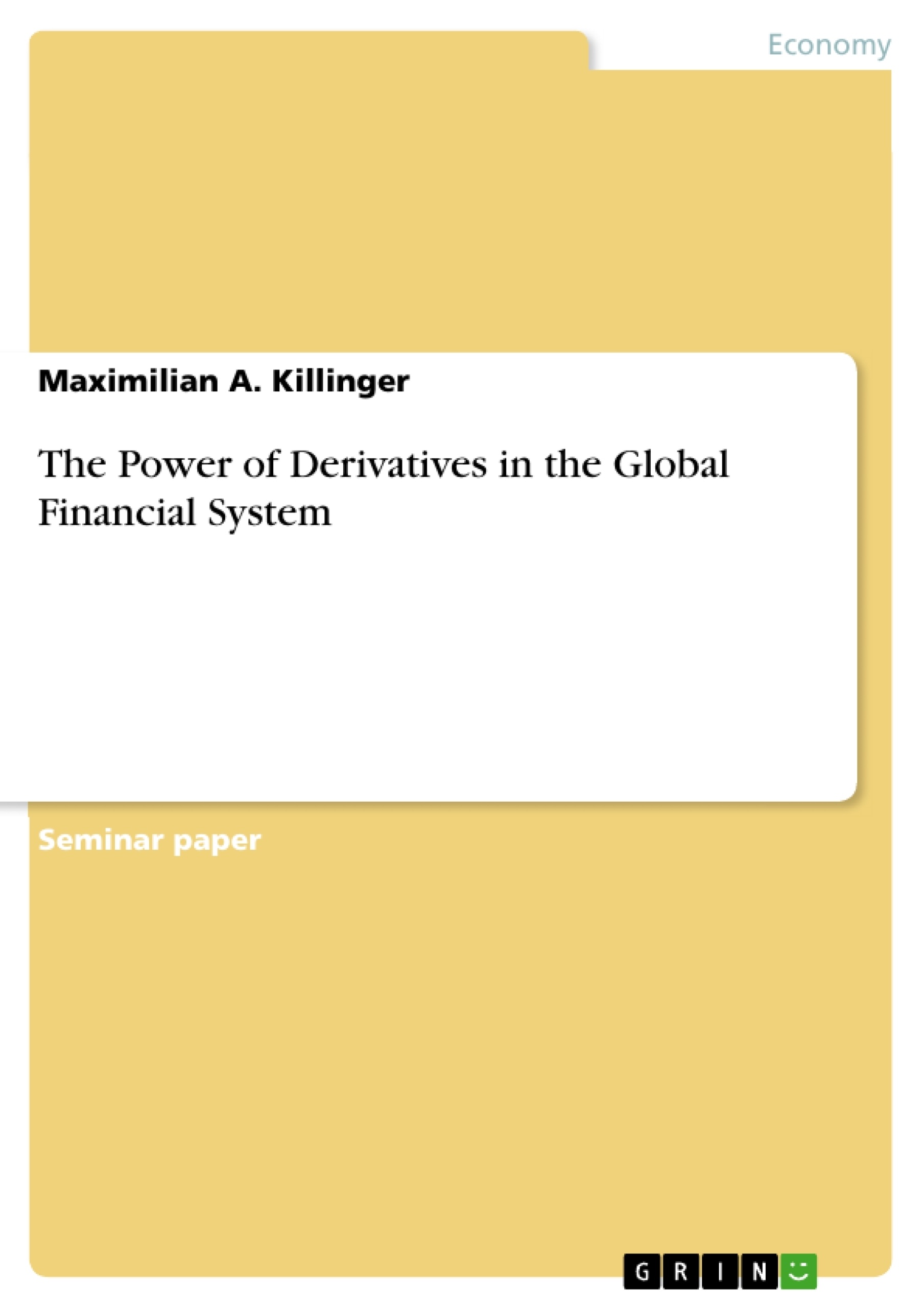This work is to discuss the role and power of derivatives in the global financial markets and their ability to reduce, diversify and enhance risks associated with international capital flows. During the last two decades derivatives, as fiscal instruments, experienced enormous growth and gained increasingly of importance. This is mainly due to their ability to allow the spreading of risks in cross border capital movements, making such investments more appealing and the diversification of portfolios more likely. Yet, derivative markets are controversial because they are not well known outside a small group of specialists. Most people look at them with suspicion and focus on their role as highly effective instruments for speculation. Given the leverage they provide fortunes can be made or lost in the wink of an eye.
Although derivatives do not create anything it will be shown in the course of this study that the importance of derivatives lies in the fact that they can be used to reduce, diversify and control uncertainty and risks associated with various corporate activities, thus creating substantial benefits as well as complexities. Section one is going to define the most common derivative products before addressing their general purpose followed by exemplifying two principal risks aligned with the use of derivatives, namely credit- and market risk.
Subsequently this works is going to discuss the positive as well as the negative effects derivatives may have on banks and investors. Sections five, six and seven will then illuminate systematic predicaments, address risks and eventually conclude after having considered the entanglement and market share of derivatives. Warren Buffett, Forbes-listed as the richest person in the world, has called credit derivatives financial weapons of mass destruction, carrying dangers that, while now latent, are potentially lethal. Nominally they are insurances against defaults, but they encourage greater gambles and credit expansion, which are moral hazards whereas Alan Greenspan, on the other hand, observed that derivatives have come to play an exceptionally important role in our financial system and in our economy. These instruments allow users to unbundle risks and allocate them to the investors most willing and able to use them. It is this study’s object to illuminate the complexity of derivatives and exemplify both, their advantageous and unfavourable but yet undeniably powerful characteristics.
Inhaltsverzeichnis (Table of Contents)
- I. Introduction
- II. Discussion
- 1. Defining derivatives
- 2. General purpose of derivatives
- 3. Addressing the main risks
- 4. Derivatives: leading to complex banking & immediate effects for investors
- 5. Systemic predicaments arising from derivatives
- 6. Extensive popularity of complex derivative products
- 7. The Power of Derivatives-derived from extensive market share and entanglement
- III. Conclusion
- IV. Tables
- V. References
Zielsetzung und Themenschwerpunkte (Objectives and Key Themes)
This work aims to examine the significant role and influence of derivatives in the global financial markets, particularly in relation to their ability to manage, diversify, and enhance risks associated with international capital flows. The paper analyzes the increasing importance of derivatives as fiscal instruments, driven by their capability to spread risks across borders, enhancing the appeal of cross-border investments and facilitating portfolio diversification. This study explores both the advantages and drawbacks of derivatives, highlighting their potential to reduce uncertainty and risks in various corporate activities while also acknowledging the complexities they introduce.
- The role and power of derivatives in global financial markets
- The ability of derivatives to manage, diversify, and enhance risks associated with international capital flows
- The growth and importance of derivatives as fiscal instruments
- The advantages and drawbacks of derivatives, including their potential to reduce uncertainty and risks while also introducing complexities
- The entanglement and market share of derivatives
Zusammenfassung der Kapitel (Chapter Summaries)
The paper begins by defining derivatives and exploring their general purpose. It then identifies two principal risks associated with the use of derivatives: credit risk and market risk. Subsequent sections discuss the positive and negative effects of derivatives on banks and investors, highlighting systemic predicaments and risks arising from their use. The final sections delve into the extensive popularity of complex derivative products and conclude by examining the entanglement and market share of derivatives in the global financial system.
Schlüsselwörter (Keywords)
Derivatives, global financial markets, risk management, diversification, fiscal instruments, cross-border capital flows, credit risk, market risk, systemic predicaments, complex derivative products, market share, entanglement.
Frequently Asked Questions
What are derivatives in financial markets?
Derivatives are financial instruments whose value is derived from an underlying asset, such as stocks, bonds, or commodities, used to manage risk or for speculation.
Why did Warren Buffett call derivatives "financial weapons of mass destruction"?
Buffett warned that credit derivatives could encourage excessive risk-taking and credit expansion, creating systemic dangers that could lead to lethal consequences for the global economy.
What are the benefits of using derivatives?
They allow companies and investors to unbundle, diversify, and control risks associated with international capital flows, making cross-border investments more appealing.
What is the difference between credit risk and market risk?
Credit risk is the danger of a counterparty defaulting on their obligation, while market risk refers to the potential for losses due to changes in market prices or interest rates.
How do derivatives affect global financial stability?
While they can enhance stability by spreading risks, their high leverage and complex entanglement can also lead to systemic predicaments and rapid contagion during financial crises.
- Arbeit zitieren
- Maximilian A. Killinger (Autor:in), 2009, The Power of Derivatives in the Global Financial System, München, GRIN Verlag, https://www.grin.com/document/142508



